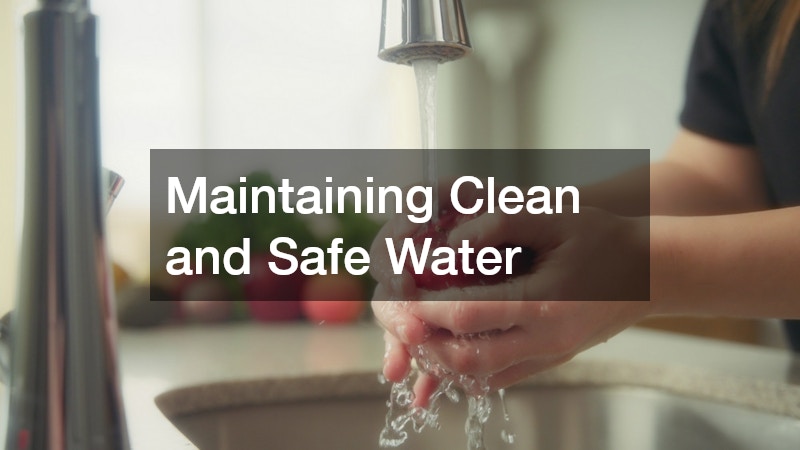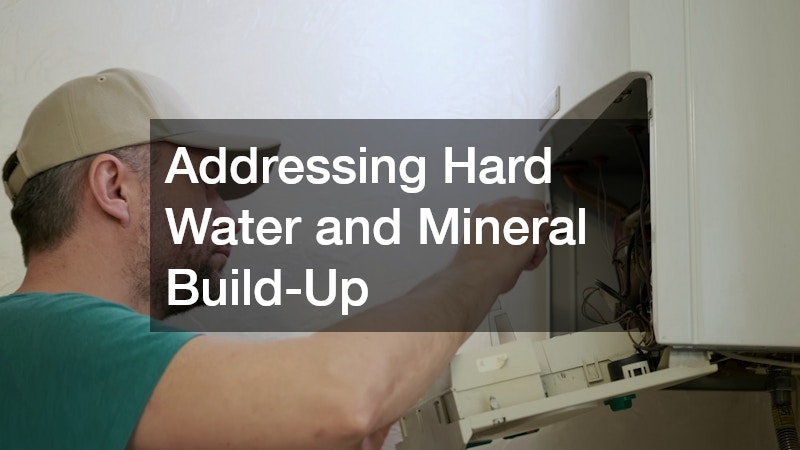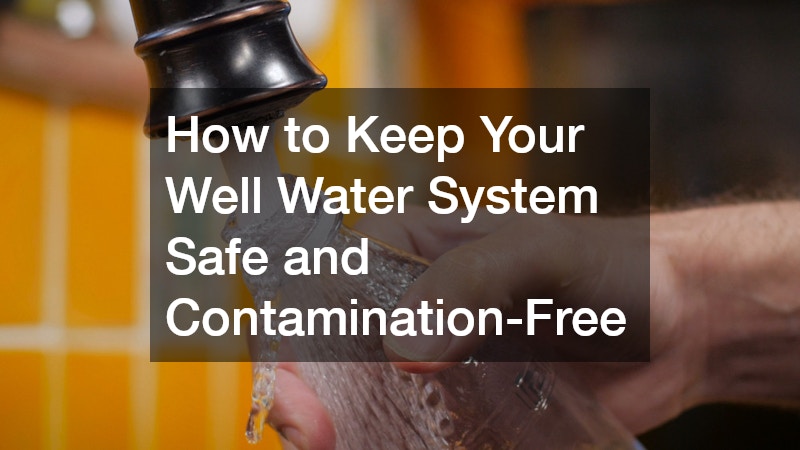Access to clean, safe water is essential for every household, powering daily activities like drinking, cooking, bathing, laundry, and cleaning. For many homes, this vital resource comes from private water well systems, which include the well itself, pumps, pressure tanks, and treatment components. These systems are the backbone of reliable water delivery, ensuring that families have a steady supply of high-quality water. However, many homeowners underestimate how quickly problems can arise when a well system is neglected. Even a minor issue—such as a failing pump, clogged pressure tank, or contaminated well—can disrupt daily routines, raise utility costs, and cause water damage or other long-term complications.
Proactive care is crucial for maintaining well performance. Regular inspections, maintenance, and timely repairs help ensure consistent water flow and quality while extending the life of pumps, pressure tanks, and filtration systems. Understanding how each component of a water well system functions enables homeowners to recognize early warning signs—like reduced water pressure, unusual noises, or cloudy water—before a small problem becomes a costly emergency.
Familiarity with your home’s water well system also empowers better decisions about upgrades, professional servicing, and preventative measures. Seasonal checks, maintenance schedules, and expert assessments keep water safe, reliable, and efficiently delivered throughout the home. By investing in the care of your water well system, homeowners not only protect their daily comfort but also reduce emergency repair costs and preserve the long-term value of their property.
Maintaining Clean and Safe Water

Having a reliable supply of clean water is crucial for both health and household efficiency. Contaminated water can affect cooking, drinking, and hygiene, while also causing staining, unpleasant odors, and reduced appliance performance. Routine testing and monitoring help ensure that water meets safety standards and remains free from bacteria, sediment, and chemical contaminants.
Investing in a professional water filtration system can significantly improve water quality. These systems remove impurities that may not be fully addressed by municipal supplies or private wells, including fine sediments, chlorine, and other chemicals. Many homeowners notice immediate improvements in taste, clarity, and smell after installation, making everyday activities like cooking and drinking more enjoyable. Regular inspections and timely filter replacements are critical to maintaining optimal performance and safeguarding the household’s health.
Proper water treatment also protects household fixtures and appliances. Mineral buildup or chemical deposits can reduce the lifespan of pipes, faucets, and water-using appliances, causing more frequent repairs and replacement costs. By prioritizing water quality, homeowners preserve the functionality of their home while maintaining property value. Well-maintained water ensures long-term efficiency and a more comfortable living environment.
Ensuring Reliable Water Flow
A home’s water flow depends on a combination of pumps and supply lines. When water pressure is inconsistent or flow is interrupted, it can disrupt daily routines and even lead to structural damage from leaks or water accumulation. Addressing these issues promptly helps prevent inconvenience and costly repairs.
Professional pump installation ensures that water reaches all areas of the home efficiently and at the proper pressure. Whether replacing an older pump or installing a new system, correctly sizing and positioning the equipment is critical for consistent performance. Regular inspections can identify early signs of wear or mechanical issues, reducing the risk of sudden failures and extended service disruptions.
Maintaining the integrity of your plumbing is equally important. Pipes naturally deteriorate over time, developing leaks, cracks, or corrosion that can compromise water delivery and safety. Timely water line repair prevents water loss, property damage, and increased utility bills. Scheduled maintenance and professional inspections help homeowners address potential issues early, keeping water systems reliable, safe, and efficient.
Heating Water for Comfort and Efficiency

Hot water is a daily necessity for showers, dishwashing, laundry, and cleaning tasks. A reliable heating system ensures comfort, convenience, and energy efficiency throughout the home. Neglecting water heating systems can result in inconsistent temperatures, reduced performance, and unexpected breakdowns.
Investing in a high-quality water heater allows homeowners to meet household demands without interruption. Routine tasks, such as flushing the tank to remove sediment buildup and inspecting pressure valves, extend the system’s lifespan and reduce the likelihood of failures. Upgrading to a modern, energy-efficient model can also lower utility bills while maintaining consistent hot water supply. Proper installation and maintenance ensure that hot water is available whenever needed, supporting everyday routines and household comfort.
Homeowners who defer maintenance on water heaters may face sudden system failures, leaving families without hot water and incurring costly emergency repairs. Regular professional servicing not only ensures consistent performance but also helps detect early signs of wear, leaks, or inefficiencies. By staying proactive, homeowners preserve the lifespan of their water heating system while improving reliability and energy efficiency.
Managing Your Well System
For homes that rely on private water sources, a properly functioning water well is the cornerstone of a safe and reliable household water supply. The well provides consistent access to water for drinking, cooking, bathing, laundry, and irrigation, making it an essential component of daily life. However, wells require ongoing attention to maintain efficiency, water quality, and consistent flow. Neglecting regular care can lead to issues such as contamination from bacteria or sediment, declining water levels, or mechanical failures, all of which can disrupt household routines and result in costly repairs or replacements. Understanding the importance of well maintenance is the first step in ensuring a dependable water supply for the long term.
When constructing a new well or replacing an old one, engaging professional well drilling services is critical. Experienced contractors carefully evaluate the property to identify the optimal drilling site, determine the correct depth, and install secure casing to protect both the water supply and surrounding soil. Proper installation ensures sufficient water yield, reduces the risk of contamination, and guarantees long-term functionality. Homeowners benefit from expert guidance throughout the process, including adherence to local regulations and compliance with industry best practices. Working with professionals also ensures that the well is designed to meet current and future household water demands, avoiding problems such as inadequate pressure, equipment strain, or premature system failures.
Routine well maintenance is equally critical for preserving water quality and system reliability. Regular inspections, water testing, and servicing of pumps, pipes, and pressure systems prevent contamination, mechanical failures, and sudden disruptions in supply. Proper upkeep ensures that the well continues to provide safe and consistent water while extending the lifespan of associated equipment. Neglecting routine maintenance can lead to serious issues, including complete system failure, which can be expensive and time-consuming to correct.
Preventing and Addressing Water Damage
Water damage is one of the most serious and costly problems a homeowner can face. Even a small leak can escalate quickly, affecting walls, flooring, ceilings, and structural components of the home. Burst pipes, failing appliances, or malfunctioning systems can lead to extensive damage in a short period of time, often resulting in costly repairs and long-term complications if not addressed promptly. Beyond visible damage, water intrusion can create hidden problems such as weakened support structures, warped floors, or compromised electrical systems, which may not be immediately apparent but can significantly impact the safety and value of a home.
Engaging a professional water damage service is essential for properly assessing and addressing affected areas. Experts can identify the full extent of damage, provide thorough cleanup, and perform necessary repairs to prevent further issues. This includes drying out materials, treating surfaces to prevent mold, and reinforcing structural components if needed. Homeowners should act quickly at the first signs of water intrusion, such as damp spots, discoloration, peeling paint, or unusual odors. Prompt intervention not only protects the home from worsening damage but also preserves its market value and ensures a safe, comfortable living environment.
Preventative measures play a crucial role in minimizing the risk of water damage. Maintaining critical systems, including pumps, water lines, and well systems, reduces the likelihood of leaks or failures. Regular inspections by professionals allow homeowners to detect potential weaknesses before they become emergencies. Timely repairs, combined with ongoing maintenance, are key to protecting the home, avoiding extensive remediation efforts, and safeguarding both property value and occupant safety. By being proactive, homeowners can mitigate risks and ensure that their water systems remain reliable, efficient, and secure.
Addressing Hard Water and Mineral Build-Up

Hard water, which contains elevated levels of minerals such as calcium and magnesium, can have a noticeable impact on household plumbing and appliances. Over time, these minerals accumulate as scale deposits inside pipes, faucets, and water-using appliances, reducing efficiency and potentially causing premature wear. Hard water can also affect the effectiveness of soaps and detergents, leaving residue on dishes, clothing, and surfaces. Without intervention, these issues can gradually escalate, leading to increased energy usage, higher utility bills, and the need for more frequent repairs or replacements.
Regular water softener repairs are essential for keeping systems that treat hard water functioning effectively. This includes inspecting and replacing worn components, testing and replenishing salt levels, and ensuring that the system operates correctly throughout the home. A well-maintained water softener prevents mineral buildup in pipes, extends the lifespan of appliances such as dishwashers, washing machines, and water heaters, and improves overall water quality. Homeowners often notice softer water, fewer stains, and improved appliance performance when their systems are properly serviced.
Neglecting water softener maintenance can quickly lead to higher repair costs, reduced efficiency, and even damage to plumbing or appliances. Scheduling routine inspections with knowledgeable professionals ensures that any emerging issues are identified early and addressed promptly. Preventative care also prolongs the lifespan of the system, reduces energy consumption, and maintains the comfort and functionality of the home. By staying proactive with water softener maintenance, homeowners can enjoy the benefits of high-quality water while avoiding costly and inconvenient repairs.
Working with Trusted Professionals
A well-maintained home relies on skilled professionals for proper system installation, maintenance, and repairs. Certified local plumbers provide expertise for a variety of water-related tasks, from repairing leaks and installing water heaters to servicing pumps and filtration systems.
Hiring experienced professionals ensures that work meets safety standards and building codes, reducing the likelihood of future problems. Additionally, professionals can provide advice on upgrades, preventative care, and efficiency improvements, helping homeowners maximize both comfort and property value.
Routine inspections and professional servicing contribute to peace of mind, knowing that critical water systems are functioning correctly. For homeowners planning to sell, having well-documented professional maintenance can also increase buyer confidence.
Planning for Long-Term Water System Efficiency

Maximizing the efficiency and lifespan of a home’s water systems requires consistent and ongoing attention, rather than waiting for problems to occur. Homeowners benefit most from a proactive strategy that combines strategic upgrades, regular maintenance, and thorough inspections to address potential issues before they escalate. This approach not only keeps water flowing reliably but also ensures that all components—from pumps and pipes to heaters and filtration systems—operate at peak performance.
Steps include:
-
Scheduling regular water testing for private water wells.
-
Monitoring pump performance and ensuring professional pump installation when needed.
-
Flushing and inspecting water heaters to maintain temperature and efficiency.
-
Repairing minor leaks or worn pipes with water line repair services.
-
Maintaining water filtration systems and water softeners to improve water quality.
-
Addressing early signs of leaks or flooding with a water damage service.
-
Consulting with local plumbers for inspections, system updates, and repairs.
A proactive approach to maintaining a home’s water systems goes far beyond simply preventing immediate problems—it actively preserves the overall functionality and safety of the property. By addressing small issues before they escalate, homeowners can avoid unexpected disruptions, such as loss of water pressure, leaks, or equipment failures, which can impact daily routines and comfort. Regular inspections, timely repairs, and preventative maintenance also reduce the likelihood of emergency situations, helping to avoid costly last-minute fixes or extensive water damage remediation.
Managing a home’s water systems is critical for comfort, safety, and long-term value. From the installation of pumps and heaters to maintaining private wells and filtration systems, each component plays a key role in daily living. Regular maintenance, timely repairs, and professional inspections prevent costly problems and ensure reliable water supply.
By investing in proper care and professional services, homeowners can enjoy reliable water, increased comfort, and improved property value, while minimizing the risk of costly repairs or disruptions. A proactive approach ensures your home remains functional, safe, and ready for both everyday living and future resale.


